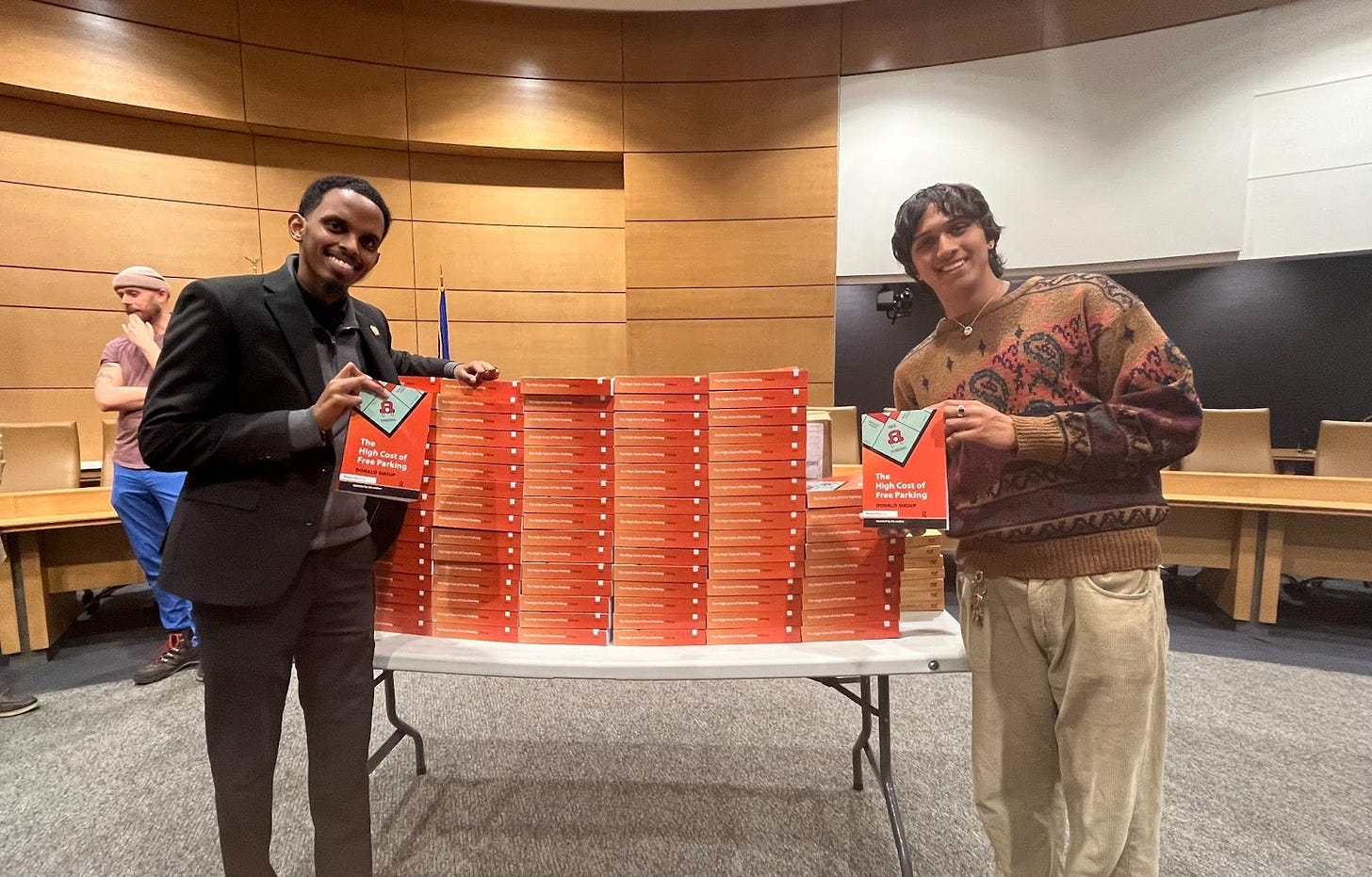I first encountered Donald Shoup as an 18-year old liberal arts student who still hadn’t declared a major. In my first semester of college, I had taken an introductory economics course and found my interests piqued, but I wasn’t sure if the field could scratch my budding urbanist itch.
Through happenstance I saw a tweet that mentioned Donald Shoup’s book The High Cost of Free Parking. The book looked pretty interesting, and I saw it was written by a guy with an economics PhD — I’d never read long-form writing by economists before. Since it was my winter break, I made my way to the Multnomah County Library and checked out Shoup’s book.
I’m sure that my first impression was not unique: that the book was way too big and heavy. But without having any school-related duties for a couple weeks, I figured I’d make a go at the book.
The book set my mind aflame. It was my first time seeing work that artfully combined economic thinking and data analysis with a deep passion for urbanism. Shoup’s work highlighted huge, glaring shortfalls in our system for parking planning that I had never heard of before, but would never be able to unsee. When I read his proposals for pricing parking meters to keep an optimal amount of street parking open at all times, I saw how one could think like an economist in service of a better urban world.
The mark his work left on me was indelible. The High Cost of Free Parking offered the language to critique so much around me — not just minimum parking requirements, but all manner of anti-housing regulatory restrictions and car-oriented planning policies.
A couple months later, as I was looking for ways to get involved with my local community in Saint Paul, I signed up as the student representative on the board of my neighborhood council. It so happened that in one of my first meetings with the housing and land use advisory committee, we were set to discuss a proposed ordinance to completely end minimum parking requirements in Saint Paul. A perfect opportunity to share my new knowledge! In my comment to the committee, I proudly discussed the newfound ideas of Donald Shoup, and how minimum parking requirements hurt us all.
Within a few months, the city council voted to end minimum parking requirements, making Saint Paul one of the fast-growing number of cities to do so. I occasionally referred to myself, or the Saint Paul city council, as “Shoup-pilled.”
Later on, I started trying to write about urban policy issues in the Twin Cities. Of course, Shoup’s ideas continued to loom large over my writing, helping structure how I thought about the tradeoffs and prioritization involved in land use and transportation policy.
At one point, I wrote a commentary in Streets.mn responding to some prominent local discourse about whether Saint Paul should move forward with plans to substantially expand the bike infrastructure on the city’s historic Summit Avenue. In the commentary, I referenced a classic Shoupian idea: that car-first infrastructure, such as free parking (or in this case, wide and fast roads) might benefit individuals when they are actively driving, but can still worsen their lives the rest of the time. After all, no one is only a driver.
Thrillingly, Donald Shoup posted the article on his Twitter account. Of course, a Tweeted link is a small gesture in the grand scheme of things. But it was enough to leave me, a young writer and college student, riding high for the next week.
Since learning of Shoup’s passing yesterday, a remarkable number of people have shared their own stories of Shoup’s transformational impact. It feels special to see some of my favorite urbanist writers and researchers — people whose work I’ve closely followed since Shoup helped spark my obsession with these topics — attest to the deep influence Shoup has had on them.
I’ve particularly seen many note how graciously Shoup connected with countless researchers and activists that reached out to him. That type of humanistic kindness, whether in exchanging an email, agreeing to an interview, or maybe just retweeting a bunch of articles, sets an admirable standard for a researcher.
Shoups’s legacy will remain in hundreds of blog posts and research articles, and countless volunteers and activists motivated to work on an important policy issue. Perhaps most importantly, his legacy will live on in dozens of bills and ordinances that have reformed and eliminated minimum parking requirements. One could only hope to have a small fraction of Shoup’s contribution in making our cities better places.






Very cool he left you with a small piece of validation. RIP to a legend.
Great homage to Shoup! I remember you expressing the impact that book had on you (and how you sometimes couldn't bear to look at the empty parking lots in PDX!)